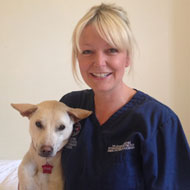“Never stop trying to make a difference”

Hayley Walters won this year's RCVS VN Golden Jubilee Award.
“We must never stop caring, never stop learning and never stop trying to make a difference for every animal that comes into our lives,” said veterinary nurse Hayley Walters as she received the prestigious 2014 RCVS VN Golden Jubilee Award.
She was chosen for the award as a result of her exceptional contribution to improving animal welfare and veterinary care across the globe and for going above and beyond her role as an RVN.
“I really do want to make a difference,” she says. “When I was little I just used to want to work with animals for my benefit. I didn't care in what capacity I worked with them so long as I was able to be with animals every single day. Over the years my feelings have changed and I work with animals now for their benefit.”
As well as her role as an anaesthesia and welfare nurse at the University of Edinburgh Hospital for Small Animals, Hayley also trains veterinary surgeon and veterinary nursing students in animal welfare, handling and pain management. She believes “education is the long-term answer to improving animal welfare.”
She also shares her knowledge with partners overseas through her work with the Jeanne Marchig International Centre for Animal Welfare Education.
“We see some horrific things when we go and teach overseas and I hope one day it will be confined to the history books forever.”
With a small team, Hayley regularly travels to developing countries to teach animal welfare in vet schools. Many of these countries still use live animals for their students to practise surgery and clinical skills.
Hayley says: “We show them alternative methods with models and manikins. This promotes a respect for all animals (not just pets) among students and will hopefully reduce the number of animals who suffer on a daily basis so that students can learn.”
During her veterinary nursing qualification, Hayley travelled to China to work with Animals Asia, a charity that rescues bears from the bile farm industry, rehabilitating them into semi-natural enclosures.
“Asiatic black bears are kept in coffin sized cages all across Asia and have the bile from their gall bladder extracted, whilst conscious, on a daily basis to be used in traditional medicine. It is a miserable, painful, frightening existence for these bears and one from which they will never escape as they are farmed until they die, often of liver tumours.
“Veterinary nursing took me to China and Vietnam to work with these bears and be part of an amazing team for three years that helped with the process of mending their broken bodies.”
During a trip to Thailand to work with a dog shelter that had just rescued 2,000 dogs from the illegal dog meat trade, Hayley even ended up adopting a dog who now lives a happy life in Scotland with her. “Many vet nurses take their work home with them,” she jokes.
To those aspiring to be veterinary nurses she warns that the job is “hard work both physically and emotionally”, often involving long hours, weekend work, being on call, unsociable work patterns and “not a great deal of money”.
On top of this, she says, nurses take their work home with them, mentally and physically. “Compassion fatigue can occur and also frustration at the general public for not taking care of their pets better, or not reading up on them before getting them or considering the financial commitment or the time and energy that would go into being a good pet owner.”
Despite this she says “it is an amazing job and if I was given the chance all over again aged 18 I would choose veterinary nursing in a heart beat.
“Every shift is different, many days are extremely rewarding, you are doing something truly worthwhile for something that really deserves it and you are making a difference to an enormous amount of animals lives just by being the best nurse you can be.
“I would say to all vet nurses out there, try and do it with all your heart. Our patients are often frightened and confused and lonely when hospitalised and they only have us to take care of their every need so we need to be cheerful, patient and gentle and never stop caring.”
Hayley will receive her award at RCVS Day on July 11. She said: “I hope that it will help in raising the profile of the veterinary nurse and of the role we play in improving animal welfare, not just in the clinic, but around the world too.”



 The Veterinary Medicines Directorate (VMD) is inviting applications from veterinary students to attend a one-week extramural studies (EMS) placement in July 2026.
The Veterinary Medicines Directorate (VMD) is inviting applications from veterinary students to attend a one-week extramural studies (EMS) placement in July 2026.